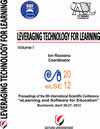LEARNING HOW TO BE A RESPONSIBLE CITIZEN IN THE VIRTUAL ENVIRONMENT
LEARNING HOW TO BE A RESPONSIBLE CITIZEN IN THE VIRTUAL ENVIRONMENT
Author(s): Gabriela Sarbu, Corina CadariuSubject(s): Education
Published by: Carol I National Defence University Publishing House
Keywords: e-Education; Security; Cybercrime; Vulnerability Management
Summary/Abstract: Virtual space and all its attached Internet services, mobile applications, computers and networks are extensions of our daily needs and life. But are most of us prepared to use them in a responsible manner? The global networking can be used not only with the good intentions. Some of the problems can be avoided with an Internet-usage literacy campaign. In this way users will be aware of their rights, their duties and the dangers that may arise if they treat electronic/Internet/mobile-issues as details not worthy for their attention. With small awareness and little knowledge of how the things work, regular users can be safer in the computer wastelands, mobile frenzy and Internet services nebulae. By buying a device, which can help you to enlist/write in a social network or on a blog, the user starts to share information that can be used against ones will. An unsecured computer or network, social engineering, fake websites can be avoided even by a regular user if there is enough knowledge upon these subjects. Banning Internet or avoiding technology in general is not the key for development, but learning how to operate and understanding the processes involved is the intelligent way. Knowing your computer, understanding how the network is actually working, securing your gateways to the Internet, comprehending and smartly using the tools of the available services from the Internet or for your mobile/smart phone will not make the user a programmer or an Internet geek, but a responsible citizen in the virtual environment. Internet-literacy is a must at any age, for all that are living in the 21th century electronic and real worlds.
Journal: Conference proceedings of »eLearning and Software for Education« (eLSE)
- Issue Year: 8/2012
- Issue No: 01
- Page Range: 550-555
- Page Count: 6
- Language: English

